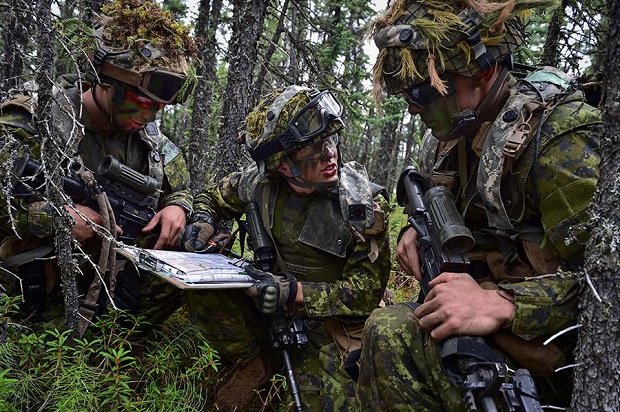By Diane Riddell
Defence Scientist Barbara Waruszynski and her colleagues have been travelling the country, listening to women of the Canadian Armed Forces (CAF). They have been to bases and wings, locations large and small, and have met with women at all levels in small focus groups. Women have been sharing what it means for them to be in the CAF and how best to recruit more women.
Canada is a world leader in both the proportion of women in its military and the areas in which they can serve. The CAF is highly regarded among allies as being at the forefront of military gender integration. Women can enroll in any CAF occupation, including operational trades, and can serve in any environment. The CAF has an ambitious employment equity target for women, aiming for a complement of 25 percent women in the CAF within the next 10 years—or an increase of 1 percent per year.
“This study has given women in the CAF an opportunity to share their insights about having a career in the Canadian military,” said Waruszynski, a scientist from Director General Military Personnel Research and Analysis (DGMPRA), which provides an integrated personnel research program for the Department of National Defence (DND) and the CAF.
Waruszynski is leading the study within the CAF that includes some 45 focus groups across Canada.
“This research will help us better understand the reasons why women join the military, the possible reasons why women are not joining the CAF, and how women currently serving in the military could contribute to improving CAFrecruitment strategies and DND outreach to increase the representation of women.”
Survey research recently conducted in 2016 among Canadian women in the general population also highlights the challenges the CAF faces in recruiting women. The research, conducted by Earnscliffe Strategy Group for DGMPRA, found that Canadian women have overwhelmingly positive views of CAF members and the work they do. They use words like proud, brave, hard-working and disciplined to describe Canada’s military.
Despite this, a significant majority – around 83 per cent – say they are unlikely to consider a career in the CAF. When given a choice, women say that the military is among the careers they would least prefer to pursue.
Many women feel that drawbacks to pursuing a career in the military include distance from family and friends, the perception that women may need to choose between careers and family and the perception that CAF members are not well-treated and may suffer from post-traumatic stress disorder after leaving the military. Some women who were surveyed said they are not comfortable with the concept of combat and fighting.
The results highlight how difficult the task can be to recruit more women to join Canada’s military and meet the ambitious employment equity targets. Currently, the representation of serving women hovers around 15 per cent. But both the survey and focus group research brought to light that helping Canadian women understand more about the CAF and what it does might make a big difference.
Of note, when asked if they would consider a career in the CAF if they knew they could pursue their career of choice, the number of those who would be willing to consider a career in the CAF more than tripled from 13 per cent to 42 per cent of respondents. And on the point of whether the CAF should recruit more women, 76 per cent of respondents said it should. In its report, Earnscliffe recommended that the CAF increase its communications around opportunities for women in the Reserve Force.
“The research on women in the CAF conducted recently both within the Regular Force and with Canadians is key to helping inform employment equity and recruitment goals,” said Lt. Gen. Chris Whitecross, Commander Military Personnel Command. “We are deeply committed to increasing the representation of women at all levels of the CAF, which includes examining any gender-based issues within the CAF.”
Waruszynski also noted that results from the focus groups with women in the CAF, which will be available later this year, will also help inform the way forward. “The opportunity to learn from serving women and talk about their lives sheds a great deal of light on their thoughts and perspectives, and what their recommendations are for not only retaining these women, but also for bringing more women into the CAF.”
Diane Riddell is communications advisor with the Director General Military Personnel Research and Analysis
